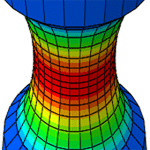WoD 19 - Rubber Fatigue DOES NOT EQUAL Metal Fatigue: Temperature Effects
Fatigue analysis for rubber differs from that for metals in many ways. This webinar looks at temperature dependence.

The low thermal conductivity of elastomers, and their dissipative character, means that frequently there is a temperature gradient and/or high interior temperatures. Also, elastomers that operate at high temperature for extended periods are likely to undergo thermochemical ageing.
Temperature has many influences that can strongly impact structural response and durability, both in helpful and in detrimental ways. We will review:
- elastic and dissipative properties
- thermal expansion/contraction
- strength and crack growth properties
- strain crystallization
- ageing
- the resistance to thermal runaway.
There are a few parameters without a temperature sensitivity: intrinsic strength and crack pre-cursor size. This review considers the characterization and modeling of the impact of temperature on durability, and includes examples computed with the Endurica fatigue solvers.
An international leader in the failure mechanics of rubber and elastomers, Dr. Will Mars has received numerous awards for his scientific contributions including the 2022 Herzlich Medal (the highest award in the tire industry) and the 2020 Tibbetts Award (by the U.S. Small Business Administration for cutting-edge technology), is the author or co-author of 50+ peer-reviewed publications and holds four patents. His expertise spans what he calls the “special effects” of rubber and elastomers in material characterization, product evaluation, constitutive modeling, crack nucleation, fracture mechanics, and fatigue life prediction methods.







